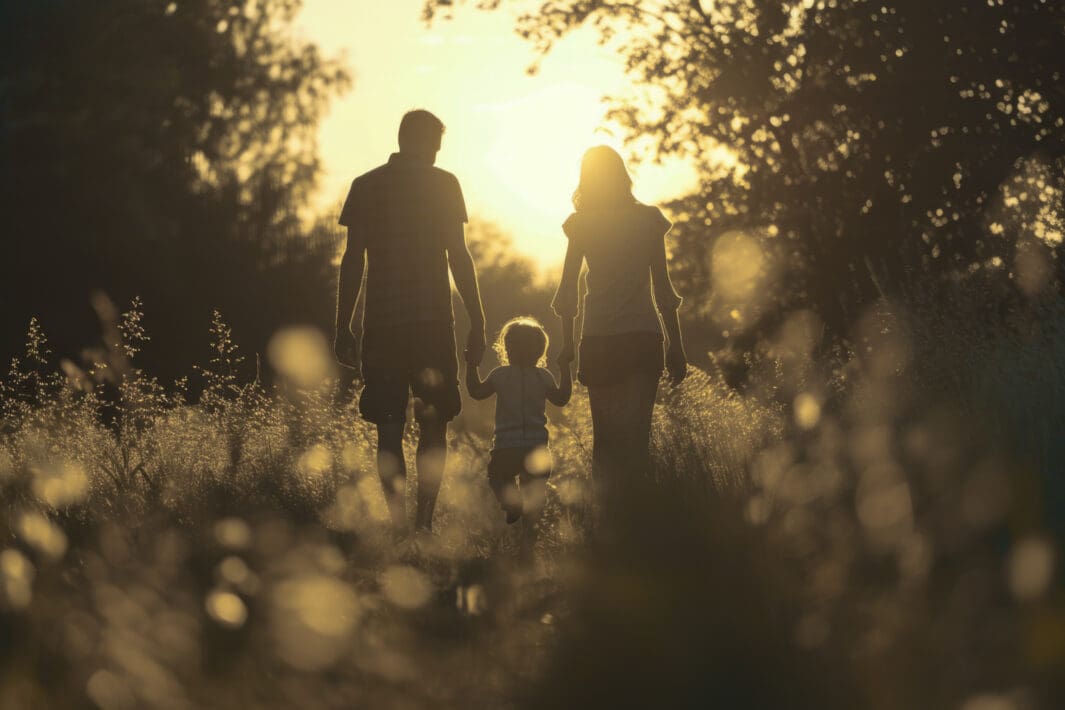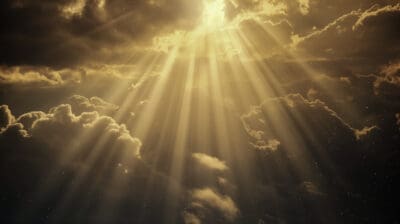
Finally, God moves Naomi from famine to feasting as the birth of Obed leads to the coming King of kings, Jesus Christ, God’s ultimate fulfillment of all his promises.
These are only preliminary, unedited outlines and may differ from Andy’s final message.
We have been tracing out this beautiful little love story, how Ruth and Boaz came together. It is not romantic, but rather a story of two godly faith-filled servants of the Lord following his law and finding blessing in obedience.
Ruth was the Moabite daughter-in-law of a Jewish woman Naomi. Naomi had been three-times bereaved… losing first her husband, then both her grown and married sons. She was determined to go back to her Jewish homeland at Bethlehem. She urged her daughters-in-law to go back to their Moabite lives. One of them did, the Moabite woman named Orpah.
But Ruth would not go back to Moab. She boldly and courageously forsook her pagan people and their wicked religion, worshiping Chemosh and the Baals… and cast her lot entirely with the God of Naomi. Ruth, placed at the fork in the road of her destiny said to Naomi, “Where you go I will go, where you stay I will stay. Your people will be my people and your God will be my God. Nothing but death can separate me from you.”
It was BY FAITH she said this. And she became what Paul would later characterize as a wild-olive shoot grafted into the cultivated olive tree of spiritual descent from Abraham.
She became a daughter of Abraham by faith… and God lavishly blessed her.
We saw her settle into the Jewish community there in Bethlehem, and obey their laws. One of their laws allowed for poor and needy people to glean in the fields of prosperous farmers. They could walk behind the harvesters and pick whatever fell from their arms, gathering enough to stay alive.
Ruth had been instructed in this gracious provision in the Laws of Moses by her mother-in-law, Naomi, and she obeyed… she diligently worked. But not just anywhere… she “happened” to end up in the field of a man named Boaz. It was truly no accident… no luck involved. God chose Ruth to be a part of Jesus’ family tree… Ruth, a Moabitess, a pagan woman converted from paganism to the true faith. The man she met, Boaz, was prepared to think well of a faith-filled convert from such a pagan background because his own mother was Rahab the prostitute, whom his father, Salmon, of the tribe of Judah, had picked to be his wife.
Boaz was introduced as a man of standing… a mighty man of wealth… blessed by the Lord in an era of sin and judgment; a man of piety and kindness, faith and generosity. A role-model for all men to follow.
He spoke kindly to her, welcomed her, protected her from all harm, and was lavishly generous to her. Best of all, he spoke words of praise and kindness to her, lifting her us as a woman of noble character. He made sure she went back to Naomi with arms full of grain.
In the last chapter, we saw Naomi coaching Ruth on how to attract Boaz to do his duties as a kinsman-redeemer. “Get yourself bathed, dressed and perfumed. Go to the threshing floor and wait. And when he comes, do what I tell you to do.”
Boaz came at the end of the festive evening… his heart lifted up with joy at the successful harvest. He lay down on the threshing floor. Ruth uncovered his feet… and waited.
They had a pure and immensely significant encounter there. Ruth asked him to fulfill his duties as a kinsman-redeemer. Boaz said he would, if the man who was a closer relative refused to do it.
Naomi told Ruth to wait, for the man would not rest until the matter was solved that very day.
I. Boaz Wins Ruth at the Town Gate
Ruth 4:1-11 Meanwhile Boaz went up to the town gate and sat there. When the kinsman-redeemer he had mentioned came along, Boaz said, “Come over here, my friend, and sit down.” So he went over and sat down. 2 Boaz took ten of the elders of the town and said, “Sit here,” and they did so. 3 Then he said to the kinsman-redeemer, “Naomi, who has come back from Moab, is selling the piece of land that belonged to our brother Elimelech. 4 I thought I should bring the matter to your attention and suggest that you buy it in the presence of these seated here and in the presence of the elders of my people. If you will redeem it, do so. But if you will not, tell me, so I will know. For no one has the right to do it except you, and I am next in line.” “I will redeem it,” he said. 5 Then Boaz said, “On the day you buy the land from Naomi and from Ruth the Moabitess, you acquire the dead man’s widow, in order to maintain the name of the dead with his property.” 6 At this, the kinsman-redeemer said, “Then I cannot redeem it because I might endanger my own estate. You redeem it yourself. I cannot do it.” 7 ¶ (Now in earlier times in Israel, for the redemption and transfer of property to become final, one party took off his sandal and gave it to the other. This was the method of legalizing transactions in Israel.) 8 So the kinsman-redeemer said to Boaz, “Buy it yourself.” And he removed his sandal. 9 Then Boaz announced to the elders and all the people, “Today you are witnesses that I have bought from Naomi all the property of Elimelech, Kilion and Mahlon. 10 I have also acquired Ruth the Moabitess, Mahlon’s widow, as my wife, in order to maintain the name of the dead with his property, so that his name will not disappear from among his family or from the town records. Today you are witnesses!” 11 Then the elders and all those at the gate said, “We are witnesses.
This shows us Boaz’s character and reputation
He is well-respected by the community, and can immediately gather ten elders to sit with him to transact business.
The role of the kinsman-redeemer was spelled out clearly
Deuteronomy 25:5-6 If brothers are living together and one of them dies without a son, his widow must not marry outside the family. Her husband’s brother shall take her and marry her and fulfill the duty of a brother-in-law to her. 6 The first son she bears shall carry on the name of the dead brother so that his name will not be blotted out from Israel.
BUT listen to the rest of it!!
Deuteronomy 25:7-10 However, if a man does not want to marry his brother’s wife, she shall go to the elders at the town gate and say, “My husband’s brother refuses to carry on his brother’s name in Israel. He will not fulfill the duty of a brother-in-law to me.” 8 Then the elders of his town shall summon him and talk to him. If he persists in saying, “I do not want to marry her,” 9 his brother’s widow shall go up to him in the presence of the elders, take off one of his sandals, spit in his face and say, “This is what is done to the man who will not build up his brother’s family line.” 10 That man’s line shall be known in Israel as The Family of the Unsandaled.
There was a shame in a man, for fear of jeopardizing his estate, refusing to do his duty for the widow of his brother.
The passing of the sandal in Ruth 4 is a tame shadow of what was really commanded. It was seen to be utterly SHAMEFUL to refuse… the widow had the right to spit in his face. Because now she has no one to provide for her.
In Boaz’s time, the sandal removal was all that happened… because there was a next man in line. Boaz would step up and care for Ruth.
The man who refused to be a kinsman-redeemer is like Orpah, the other daughter-in-law… through fear and unbelief they missed eternal blessing.
II. Blessings Spoken on Boaz’s Faith
Ruth 4:11-12 Then the elders and all those at the gate said, “We are witnesses. May the LORD make the woman who is coming into your home like Rachel and Leah, who together built up the house of Israel. May you have standing in Ephrathah and be famous in Bethlehem. 12 Through the offspring the LORD gives you by this young woman, may your family be like that of Perez, whom Tamar bore to Judah.”
These words are almost prophetic… but in actuality, they come infinitely short of the blessings that would come from Boaz’s marriage to Ruth.
The immediate outcome was a blessed homelife, including the birth of a son:
Ruth 4:13 So Boaz took Ruth and she became his wife. Then he went to her, and the LORD enabled her to conceive, and she gave birth to a son.
Naomi was not forsaken either… as I said, this story KEEPS COMING BACK TO HER!
Ruth 4:14-17 The women said to Naomi: “Praise be to the LORD, who this day has not left you without a kinsman-redeemer. May he become famous throughout Israel! 15 He will renew your life and sustain you in your old age. For your daughter-in-law, who loves you and who is better to you than seven sons, has given him birth.” 16 Then Naomi took the child, laid him in her lap and cared for him. 17 The women living there said, “Naomi has a son.” And they named him Obed.
This shows how God has a plan even for the weakest and most insignificant people… Naomi was a widow who had lost both sons and seemed to have no future. Instead God used her character and faith to allure Ruth into salvation through faith in the true God; she used her connections in Bethlehem to draw Ruth into food and then a husband, Boaz, through the kinsman-redeemer law. And now, she is an honorary grandmother to the little baby Obed
THE REST OF THE STORY:
Ruth 4:17-22 And they named him Obed. He was the father of Jesse, the father of David. 18 ¶ This, then, is the family line of Perez: Perez was the father of Hezron, 19 Hezron the father of Ram, Ram the father of Amminadab, 20 Amminadab the father of Nahshon, Nahshon the father of Salmon, 21 Salmon the father of Boaz, Boaz the father of Obed, 22 Obed the father of Jesse, and Jesse the father of David.
Remember the setting of this whole story:
Judges 21:25 In those days Israel had no king; everyone did as he saw fit.
David would become the greatest king that ever lived.
But Jesus, the Son of David, would be the king of the kingdom of God…
All of that came from God’s wonderful providence in this beautiful story of Ruth.
Fulfilled Symbols:
1. Jesus is the Bread of Life
a. Bethlehem = “house of bread”
b. Food is a major part of this story
c. Jesus is the Bread of Life…
John 6:48-51 I am the bread of life. 49 Your forefathers ate the manna in the desert, yet they died. 50 But here is the bread that comes down from heaven, which a man may eat and not die. 51 I am the living bread that came down from heaven. If anyone eats of this bread, he will live forever. This bread is my flesh, which I will give for the life of the world.”
2. Jesus is the Kinsman-Redeemer
3. Jesus is the Bridegroom
4. Jesus is the Harvest Feast
5. Jesus is the Child Born to Lead
6. Jesus is the Wings of Refuge
7. Jesus is the Coming King








